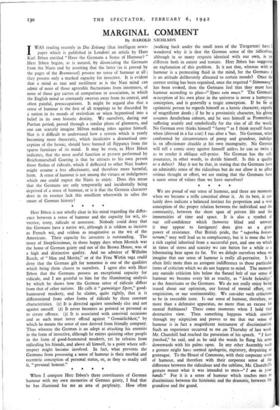Herr Ibben is not wholly clear in his mind regarding
the differ- ence between a sense of humour and the capacity for wit, ins- vective, irony, ridicule or nonsense. Nobody could deny that the Germans have a native wit, although it is seldom as incisive as French wit, and seldom as imaginative as the wit of the Americans. Their capacity for invective is outstanding. The irony of Simplicissimus, in those happy days when Munich was the home of German gaiety and not of the Brown House, was of a high and distinctive quality. And no admirer of Wilhelm Busch, of " Max and Moritz," or of the Frau Wirtin saga could deny that the German gift for nonsense is one of the qualities which bring them closest to ourselves. I agree also with Herr Ibben that the Germans possess an exceptional capacity for ridicule, and I am grateful to him for the illuminating analysis by which he shows how the German sense of ridicule differs from that of other nations. He calls it "gutmiatiger Sport," good- humoured mockery, and he claims, quite rightly, that it is differentiated from other forms of ridicule by three constant characteristics. (r) It is directed against somebody else and not against oneself. (2) It never becomes so pointed or personal -as to create offence. (3) It is associated with convivial occasions and as such must never offend against " Gemiitlichkeit," by which he means the sense of ease derived from friendly company. Thus whereas the German is an adept at attacking his enemies in the form of invective, although he enjoys quizzing other people in the form of good-humoured mockery, yet he refrains from ridiculing his friends, and above all himself, to a point where self- respect might become involved. In fact, what prevents the Germans from possessing a sense of humour is their morbid and eccentric conception of personal status, or, as they so madly call it, " personal honour."
* * * *


























 Previous page
Previous page